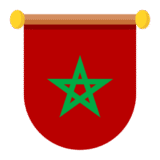Perfect 10-Day Morocco Travel Itinerary
Did you know that Morocco is a country that can leave you wanting more, even after a ten-day adventure? We recently spent ten days exploring this North African gem and were amazed by its vastness and diversity.
From the bustling cities to the serene desert landscapes, Morocco offers a unique blend of adventure and cultural immersion. Our journey took us through the vibrant souks of Marrakech, the golden dunes of the Sahara Desert, and other captivating places that left us in sensory overload.
We’ll guide you through the best way to experience Morocco, whether you’re hiring a driver or joining a tour. With our comprehensive 10-day itinerary, you’ll be able to make the most of your time and create unforgettable memories.
Why Morocco Should Be Your Next Travel Destination
With its unique blend of ancient traditions and modern life, Morocco is a destination that promises an unforgettable adventure. As we explore this captivating country, you’ll discover a land where vibrant cities, ancient medinas, and vast deserts collide to create an experience like no other.
A Land of Contrasts and Vibrant Culture
Morocco is a land where ancient traditions and modern life coexist, creating a cultural tapestry that feels like stepping into another world. The country’s diverse landscapes, from the snow-capped Atlas Mountains to the golden beaches along the coast, offer something for every type of traveller. Whether you’re wandering through the bustling souks of Marrakech, admiring the medieval architecture of Fez, or getting lost in the blue streets of Chefchaouen, every moment is a discovery.
| Experience | Location | Highlights |
|---|---|---|
| Cultural Immersion | Marrakech, Fez | Bustling souks, medieval architecture |
| Nature & Adventure | Atlas Mountains, Sahara Desert | Trekking, camel rides, stargazing |
| Relaxation | Coastal towns | Golden beaches, local cuisine |
Moroccan hospitality is legendary, with locals often inviting visitors to share a cup of tea and conversation, making your trip more meaningful. With a well-established tourism infrastructure, finding quality hotels, reliable guides, and car hire services is straightforward, making your visit hassle-free even if you have just a few days to explore.
As you plan your tour, consider the diverse experiences Morocco has to offer. Whether you’re looking for a relaxing getaway or an action-packed day trip, Morocco has something for everyone, making it the perfect destination for your next trip.
Best Time to Visit Morocco
As we guide you through the best times to visit Morocco, you’ll discover that the country’s diverse climates and cultures make it a year-round destination. Morocco’s varied geography, from the Atlas Mountains to the Sahara Desert, means that the ideal time for your trip can vary significantly.
Seasonal Considerations
Although each season in Morocco offers unique experiences, spring (April through June) and autumn (September through November) are widely regarded as the best times to visit. During these periods, the weather is pleasantly warm, making it perfect for exploring historic cities like Marrakech, Fez, and Casablanca, as well as enjoying outdoor activities in the Atlas Mountains. Summer is ideal for beach lovers, particularly in coastal cities like Essaouira and Agadir, while winter is suitable for cultural excursions in the cities, with fewer tourists allowing for a more authentic experience.
- Spring and autumn offer pleasant temperatures, making them ideal for city exploration and outdoor activities.
- Summer can be extremely hot, especially in the desert regions, making sightseeing challenging during the day.
- Winter brings cooler temperatures, excellent for city exploration, though mountain areas may experience snow.
- Each season offers a different way to experience Morocco’s food culture, with seasonal ingredients playing a significant part in traditional cuisine.
- Consider the timing of Ramadan when planning your itinerary, as it can affect the opening hours of attractions and the availability of guides and drivers for tours.
Weather Expectations Throughout the Year
Understanding Morocco’s weather is crucial for planning your trip. The country’s climate varies greatly from north to south and from the coast to the desert. By considering these factors, you can plan your Morocco itinerary to make the most of your day trips and stops along the way, enjoying the diverse experiences Morocco has to offer.
Planning Your Morocco Travel Itinerary
As you prepare for your Moroccan adventure, it’s essential to consider a few key factors to make the most of your trip. Morocco is a country that offers a rich tapestry of experiences, from the bustling streets of Marrakech to the serene dunes of the Sahara Desert.
Visa Requirements for British Travellers
For British travellers, Morocco is a relatively accessible destination. Full passport holders from the UK do not need a visa to enter Morocco and can stay for up to 90 days. However, it’s always a good idea to check the latest visa requirements before your trip, as policies can change. Upon arrival, you’ll need to complete a form with your personal details, profession, and the purpose of your visit.
Budgeting for Your Moroccan Adventure
Budgeting is a crucial aspect of planning your trip. Consider allocating money for guided experiences, especially for desert excursions where local knowledge is invaluable. The cost of camel rides and desert camping can vary, so it’s a good idea to research and budget accordingly. Additionally, you should factor in the cost of accommodation, food, and transportation. The local currency is the Moroccan Dirham (MAD), which you can obtain at the airport or withdraw from ATMs throughout the country.
| Expense | Estimated Cost (MAD) | Estimated Cost (GBP) |
|---|---|---|
| Guided Desert Excursion | 800 – 1,200 | 60 – 90 |
| Accommodation per night | 200 – 500 | 15 – 38 |
| Meal at a local restaurant | 50 – 100 | 4 – 8 |
Essential Items to Pack
Packing the right items is vital for a comfortable and enjoyable trip. Essential items include modest clothing, particularly for women, a good hat for sun protection, comfortable walking shoes, and a light jacket for cool desert nights. If you plan to experience the Sahara Desert, consider purchasing travel insurance that covers camel riding and other adventure activities.
By considering these factors, you can ensure a well-planned and enjoyable trip to Morocco, making the most of your time in this beautiful country.
Getting to Morocco
With several airlines operating direct flights, reaching Morocco from the UK is hassle-free. Whether you’re heading to Marrakech for a vibrant city experience or Casablanca for business, flying is the most convenient way to start your trip.
Flight Options from the UK
From the UK, you can fly directly to Morocco with several airlines, including Royal Air Maroc, which offers daily flights from Heathrow to Casablanca. British Airways also operates flights from Gatwick to Marrakech. The flight time averages around 3.5 hours, making it a relatively short journey. It’s advisable to book your flights well in advance, especially during peak travel seasons, as prices tend to increase a bit closer to the departure date.
Considering your itinerary and travel plans within Morocco, you should also think about how you’ll travel between cities. Whether by car, train, or arranging a driver for certain days of your journey, planning ahead will make your trip smoother.
Arriving at Moroccan Airports
Upon arriving at Moroccan airports, it’s a good idea to have some local currency on hand for taxis or to purchase a SIM card for your mobile. This will help you navigate your way around and avoid getting lost. Many hotels also offer airport transfer services, which can be particularly convenient if you’re arriving in the evening when public transport options may be limited.
As you plan your trip to Morocco, consider the time of year and how it might affect your travel plans. With a well-planned itinerary, you’ll be able to make the most of your day trips and enjoy the various things Morocco has to offer, from guided tours to exploring the vibrant city life.
Transportation Within Morocco
We find that getting around Morocco is quite manageable, given the variety of transportation choices available. Whether you’re looking to explore the bustling cities or venture into the remote landscapes, there’s a travel solution to suit your needs.
Hiring a Driver vs. Public Transport
Hiring a private driver is one of the most comfortable ways to travel around Morocco, offering flexibility with your Morocco itinerary and the benefit of local knowledge. On the other hand, public transport in Morocco is surprisingly efficient, with a good rail network connecting major cities and numerous bus companies offering services to smaller towns.
For a lot of travellers, the choice between hiring a driver and using public transport depends on their adventure plans and budget. If you’re looking to explore remote areas like the High Atlas Mountains or the Sahara Desert, hiring a driver can be the best option.
Navigating Moroccan Cities
Navigating Moroccan cities can be an adventure in itself, with narrow medina streets often accessible only on foot and modern areas more suited to taxis or ride-sharing services. In cities like Marrakech, a day can be spent exploring the souks and historical landmarks on foot, while a trip to nearby towns might involve taking a grand taxi or bus.
To make the most of your time in Morocco, consider combining different transport methods—perhaps a driver for remote areas and trains or buses for travel between major cities. This way, you can enjoy a hassle-free journey and make the most of your trip to Morocco.
Day 1-2: Exploring Casablanca and Rabat
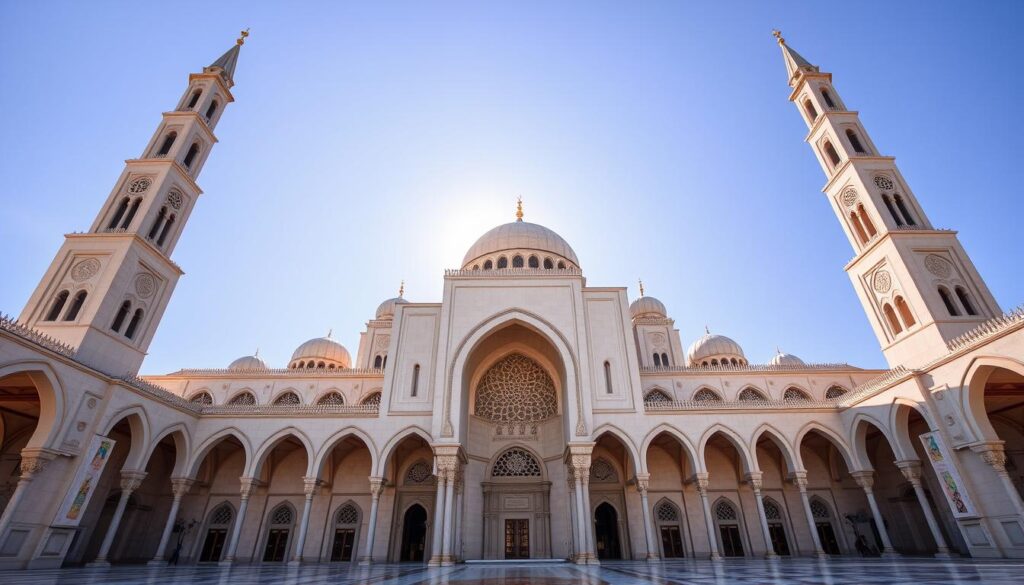
Casablanca, with its rich history and cosmopolitan flair, is the perfect introduction to Morocco’s diverse landscapes and cultural heritage. Our Moroccan adventure begins here, where the magnificent Hassan II Mosque—one of the largest in the world—offers a spectacular introduction to the country’s architectural grandeur.
Must-See Sights in Casablanca
Begin your day with a visit to the iconic Hassan II Mosque, an architectural masterpiece perched over the Atlantic Ocean. Take time to stroll along Casablanca’s Corniche, enjoying the sea views, and perhaps visit Rick’s Café, inspired by the classic film, for a nostalgic experience before enjoying lunch at a local restaurant.
The Hassan II Mosque is a must-see attraction, not just for its religious significance but also for its stunning architecture. As you explore the mosque, you’ll be struck by its grandeur and the intricate details that adorn its walls and ceilings.
A Day Trip to Rabat
On your second day, make your way to Rabat, Morocco’s capital city, where you can visit the 12th-century Kasbah des Oudaias, the unfinished Hassan Tower, and the ornate Mausoleum of Mohammed V. The journey between these two cities offers glimpses of the Atlas Mountains in the distance and provides a perfect way to observe everyday Moroccan life outside the tourist hotspots.
End your day with a traditional Moroccan dinner, perhaps accompanied by mint tea, which is not just a beverage but an important cultural ritual and symbol of hospitality in Morocco. As you sip your tea, you’ll experience the warmth and generosity of Moroccan culture firsthand.
Day 3-4: The Blue Pearl of Chefchaouen
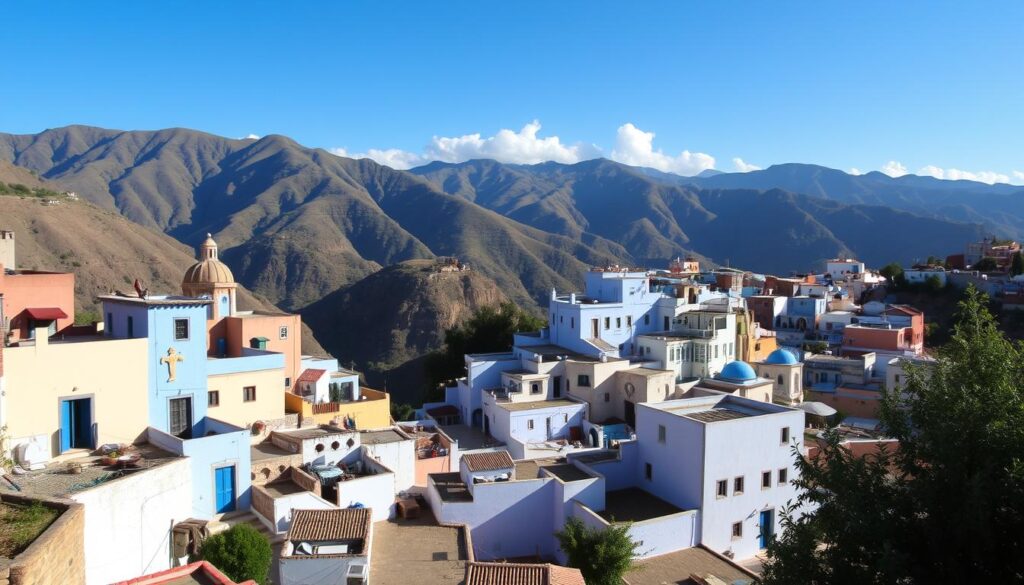
As we continue our Morocco travel itinerary, the charming town of Chefchaouen awaits on day three, nestled in the Rif Mountains. This picturesque destination is a welcome respite from the sensory overload of larger cities, offering a tranquil atmosphere that captivates visitors.
Wandering Through the Blue Medina
Spend your days wandering through the labyrinthine streets of Chefchaouen’s medina, where vibrant textiles and handmade crafts line the narrow alleys. Every corner presents a new photo opportunity, with varying shades of blue creating a dreamlike atmosphere. For panoramic views, hike up to the “Spanish” Mosque, perched on a hill overlooking the town. Don’t miss Ras el-Ma, a natural spring and gathering spot for locals.
Where to Stay and Eat in Chefchaouen
For accommodation, consider staying in a traditional riad within the medina for the most authentic experience. Alternatively, choose a hotel with mountain views if you prefer to be away from the bustle. End your evenings with dinner at a rooftop restaurant, where you can enjoy local specialities like goat cheese accompanied by mint tea while watching the sunset paint the blue city in golden hues.
As you plan your trip to Chefchaouen, consider hiring a driver or booking a tour to make the most of your time. While in Chefchaouen, take a moment to appreciate the serene surroundings, and get ready for the next part of your Moroccan adventure, which may include a journey to the Sahara Desert or exploring the dunes.
Day 5-6: Immersing in Fez’s Ancient Medina
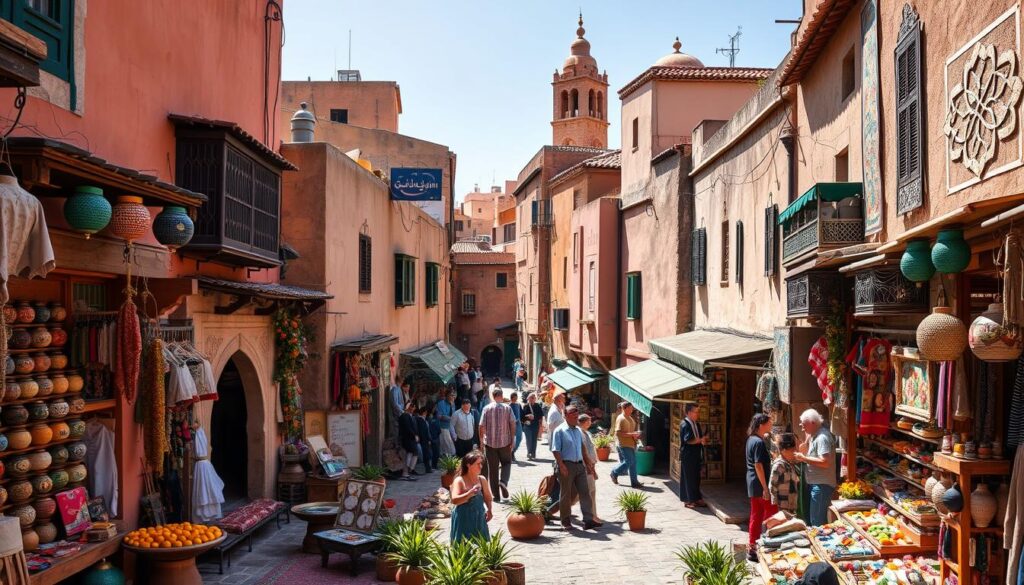
After experiencing the blue-hued tranquility of Chefchaouen, we immerse ourselves in Fez’s ancient medina. Fez, Morocco’s cultural and spiritual capital, is a city that will captivate your senses and challenge your perceptions.
Navigating the Labyrinthine Streets of Fez
Fez is home to the world’s largest car-free urban area, with a medina so complex that even locals sometimes get lost in its 9,400 winding streets and alleyways. Hiring a local guide is highly recommended for at least your first day in Fez, as they can help you navigate the maze-like medina while sharing insights about the city’s rich history and culture.
As you wander through the medina, you’ll encounter numerous iconic sights, including the ancient tanneries, where leather has been dyed using the same techniques for centuries. Be prepared for the strong smell, though mint leaves are often provided to help mask it.
Cultural Experiences in Morocco’s Spiritual Capital
In the evening, enjoy a traditional Moroccan lunch at one of the many family-run restaurants, where dishes like pastilla showcase the sophisticated flavours that make Moroccan cuisine one of the world’s most distinctive. Spend your time exploring the Al-Qarawiyyin, founded in 859 and considered by many to be the oldest continuously operating university in the world.
Fez is a city that rewards exploration. Take your time to wander through its streets, soak up the atmosphere, and discover the many hidden gems that make Fez such a unique and unforgettable destination on your Morocco itinerary.
Day 7: A Day Trip to Meknes and Volubilis
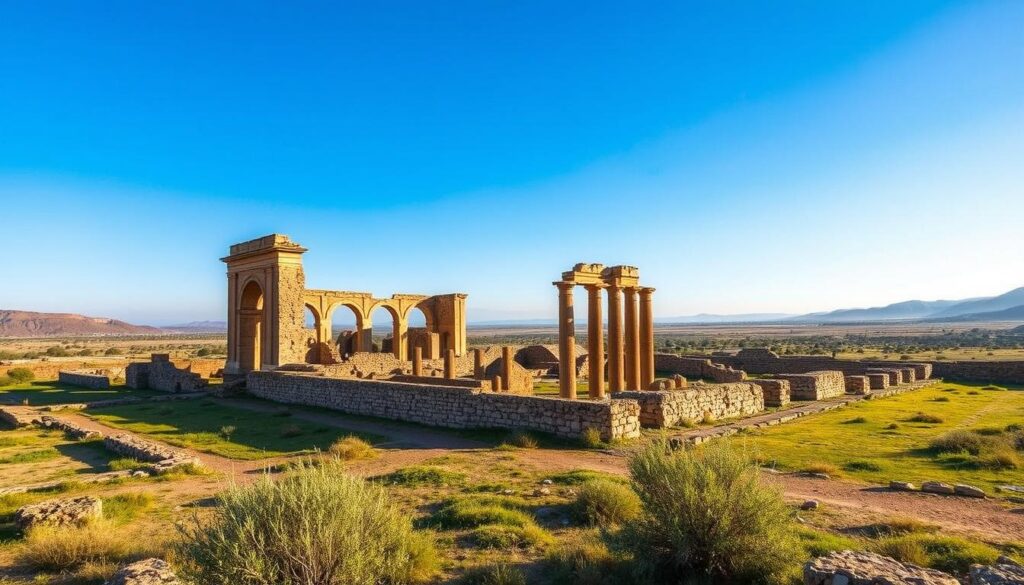
We spend Day 7 delving into Morocco’s diverse past with a visit to the Roman ruins of Volubilis and the imperial grandeur of Meknes. This day trip offers a unique experience that combines history, culture, and scenic beauty.
Exploring Morocco’s Roman Past
Our journey begins at Volubilis, a UNESCO World Heritage Site and one of Morocco’s most significant historical treasures. As we explore the ancient Roman ruins, we are treated to a glimpse into life in Roman North Africa. The site is renowned for its remarkably preserved mosaics and towering columns, which have withstood the test of time. As we wander through the archaeological site, we gain a deeper understanding of the Roman occupation’s impact on the region.
The site’s preservation is a testament to the rich history of the country, and it provides a fascinating lot to explore, from the remains of Roman villas to the ancient city’s infrastructure.
The Imperial City of Meknes
After exploring Volubilis, we continue our trip to Meknes, an imperial city that boasts impressive monuments and historical landmarks. The city’s grandeur is evident in its massive gates, such as Bab Mansour, and grand sites like the Royal Stables and Moulay Ismail Mausoleum. As we stroll through Meknes’ medina and souks, we experience the vibrant culture and history of this often-overlooked city.
To make the most of our day, we recommend arranging a driver for the excursion, allowing us to enjoy the scenic route and make stops along the way. After a fulfilling day of exploration, we return to our hotel in Fez, perhaps enjoying dinner with views of the Atlas Mountains in the distance.
Day 8-9: Sahara Desert Adventure
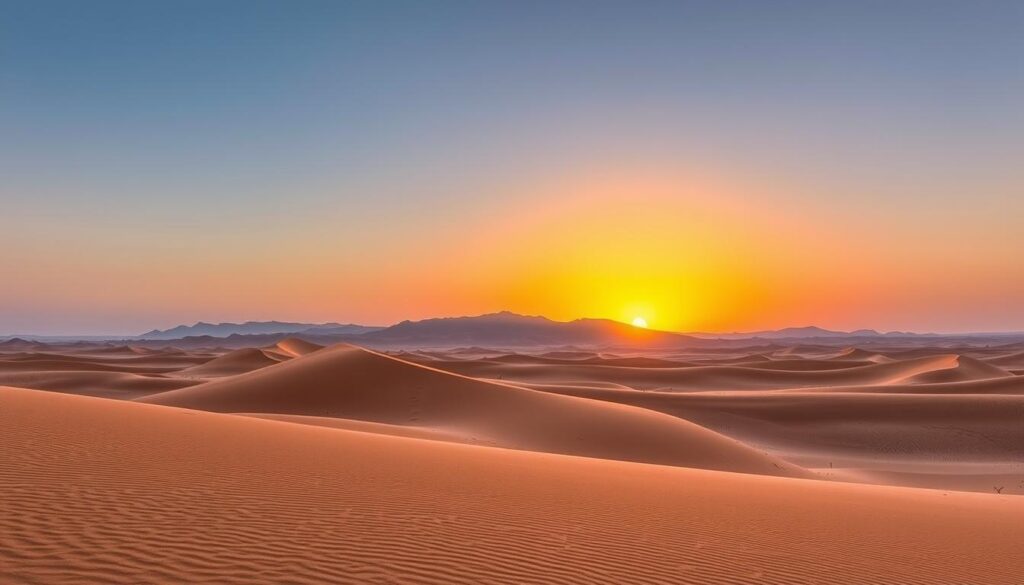
Our Sahara Desert adventure begins with a scenic drive to Merzouga, the gateway to the Erg Chebbi dunes. As we travel through the Middle Atlas Mountains, we pass through cedar forests and traditional Berber villages, witnessing the diverse landscapes that Morocco has to offer. A stop at the breathtaking Ziz Valley Oasis, with its lush date palms, provides a picturesque break. Arriving in Merzouga in the late afternoon, we are greeted by the towering Erg Chebbi dunes, a sight that is truly awe-inspiring.
Journey to Merzouga and the Erg Chebbi Dunes
The journey to Merzouga is an adventure in itself, taking us through changing landscapes that tell the story of Morocco’s geographical diversity. As we cross the Middle Atlas Mountains, the scenery transforms from lush forests to arid desert landscapes. Upon arriving at Merzouga, the sheer size and beauty of the Erg Chebbi dunes leave us spellbound. These golden mountains of sand, reaching heights of up to 150 metres, are a marvel of nature.
Camel Trekking and Desert Camping Experience
A camel trek into the desert is a quintessential Moroccan experience, allowing us to travel the same way people have crossed these landscapes for centuries. As we ride camels led by Berber guides, we enjoy a picnic lunch among the dunes, savouring the serene atmosphere. After exploring the surrounding area, we return to our luxurious desert camp for the night, where we can feel like we’re truly immersed in the desert’s tranquility.
Stargazing and Berber Cultural Immersion
Spending the night in the desert camp under the stars offers an unparalleled opportunity to disconnect from modern life and experience the profound silence and beauty of the Sahara. We enjoy traditional Berber hospitality with a dinner of tagine cooked over open flames, followed by mint tea and music around the campfire—a magical way to immerse ourselves in local culture. As we gaze up at the star-filled sky, we feel grateful for this unforgettable adventure.
As we conclude our Sahara Desert adventure, we reflect on the incredible experiences we’ve had, from camel trekking through the dunes to stargazing under the desert night sky. This journey has been a significant part of our Morocco itinerary, leaving us with memories that will last a lifetime.
Day 10: Marrakech – The Red City
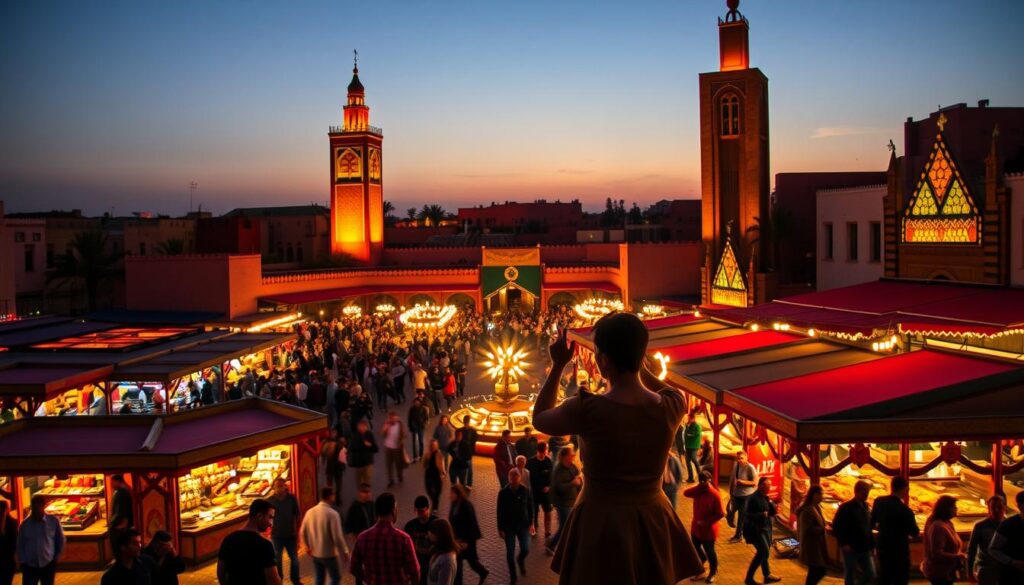
Our journey through Morocco culminates in Marrakech, a city of sensory delights. Marrakech, known as the “Red City,” is the perfect finale to our Morocco itinerary, offering a sensory feast that encapsulates the country’s vibrant culture and history.
Navigating Jemaa el-Fnaa and the Souks
Begin your exploration at Jemaa el-Fnaa, the famous main square that transforms throughout the day. In the morning, it’s relatively calm, but by evening, it becomes a bustling carnival of food stalls, performers, and storytellers. The labyrinthine souks that branch off from the main square invite you to get lost for hours, discovering different crafts—from metalwork and leather to textiles and spices.
As you wander through the souks, take your time to absorb the atmosphere and haggle for unique souvenirs. Consider hiring a guide for your first day in Marrakech to help you navigate efficiently and learn about the city’s rich history.
Palaces and Gardens of Marrakech
Visit the stunning Bahia Palace, a masterpiece of Moroccan architecture with its intricate tilework, painted ceilings, and tranquil courtyards. This experience offers a peaceful respite from the busy medina. Additionally, explore the iconic Koutoubia Minaret and the lush Majorelle Garden, each a testament to Marrakech’s architectural and cultural heritage.
As the evening falls, return to Jemaa el-Fnaa to enjoy the street performers, storytellers, and local cuisine at one of the many open-air stalls. Sampling local dishes is a must, making for an unforgettable experience that concludes your trip on a high note.
Where to Stay During Your Morocco Travel Itinerary
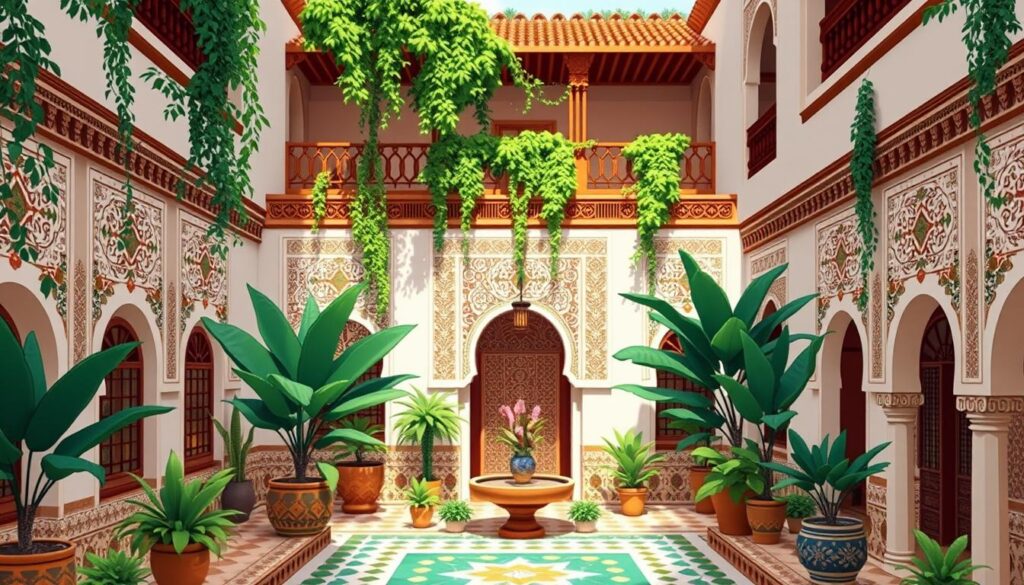
From traditional riads to modern hotels, Morocco’s accommodation options are vast and varied. The right choice can significantly enhance your travel experience, whether you’re exploring bustling medinas or relaxing in serene desert landscapes.
Traditional Riads vs. Modern Hotels
Traditional riads offer an authentic cultural experience, with their interior courtyards and traditional Moroccan architecture. They are often located in the heart of medinas, making them ideal for exploration. On the other hand, modern hotels provide more amenities and can be more comfortable for those who prefer contemporary conveniences after a day of adventure. We recommend considering both options as part of your Morocco travel itinerary, perhaps splitting your time between a riad in the medina and a more relaxed hotel stay with a pool.
For a truly immersive experience, consider staying in a riad for at least part of your trip. This will give you a chance to enjoy traditional Moroccan hospitality and cuisine, including a delicious dinner in the riad’s courtyard.
Accommodation Recommendations for Each Destination
When in Casablanca, stay near the Corniche for ocean views or downtown for easy access to main landmarks. In Chefchaouen, choose accommodations near the medina to be close to the town’s iconic blue streets and local cafes. For Fez, staying in or near the Fez el-Bali medina offers an authentic experience with easy access to souks and historic landmarks. In the Sahara Desert, a luxury desert camp nestled within the Erg Chebbi dunes provides a once-in-a-lifetime experience. In Marrakech, the medina is one of the best areas to stay, surrounded by bustling souks and historic landmarks.
For a lot of travellers, the choice of accommodation can make or break the trip. We suggest considering the type of experience you want for your day trips and choosing your accommodation accordingly. Whether you’re looking to explore the vibrant streets of Marrakech or relax in a serene desert camp, Morocco has a wide range of options to suit your needs.
Moroccan Cuisine: What to Eat on Your Journey
As we explore Morocco, we’ll discover that its cuisine is a delicious blend of traditional Berber, Arabic, Andalusian, and Mediterranean influences. This rich culinary heritage is reflected in the diverse dishes we encounter during our travels.
Must-Try Moroccan Dishes
Moroccan cuisine offers a variety of must-try dishes that showcase its unique flavors and cooking techniques. Tagine, named after the conical clay pot it’s cooked in, is a slow-cooked stew that comes in numerous variations, such as lamb with prunes or chicken with preserved lemon and olives. We should also try couscous, traditionally served on Fridays, and pastilla, a sweet and savory pie that’s a true culinary delight. And no visit is complete without sipping on mint tea, a ubiquitous beverage that’s a sign of hospitality throughout the country.
| Dish | Description | Price Range ($) |
|---|---|---|
| Tagine | Slow-cooked stew | 5-15 |
| Couscous | Traditional Friday dish | 3-10 |
| Pastilla | Sweet and savory pie | 10-20 |
Dining Etiquette and Food Safety Tips
When dining in Morocco, it’s essential to be mindful of local customs and etiquette. Traditionally, meals are eaten with the right hand, and hands are washed before and after meals. Food is often served communally, adding to the communal atmosphere of dining. For food safety, it’s advisable to be cautious with raw vegetables, unpeeled fruits, and tap water, especially during the initial days of our trip as our system adjusts to the local environment.
Shopping in Morocco: Souvenirs to Bring Home
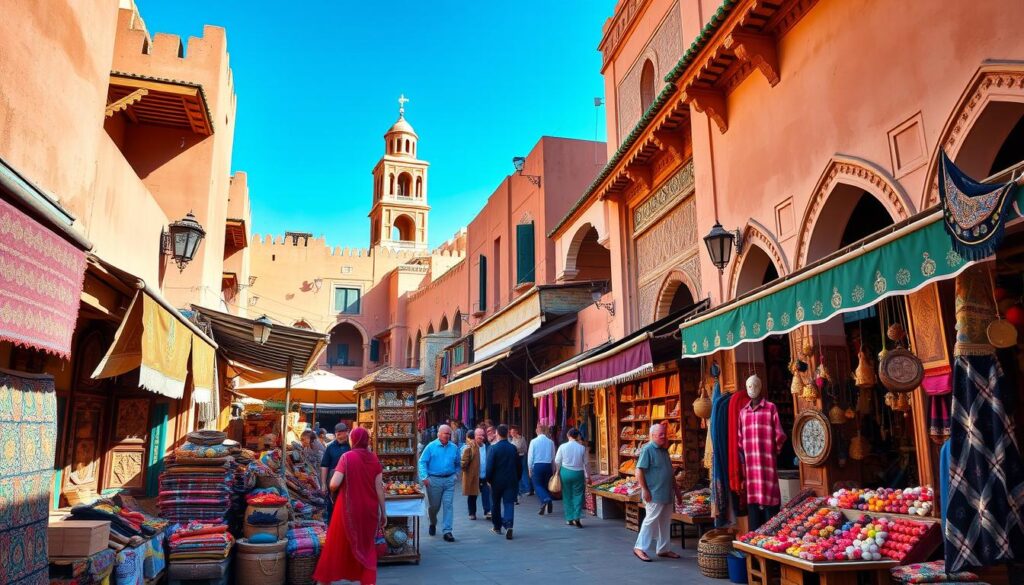
The art of shopping in Morocco is a sensory journey that takes you through labyrinthine medinas, bustling markets, and serene riads. As we explore the souks, we discover a world of unique souvenirs, traditional crafts, and local specialties waiting to be uncovered.
Navigating the Souks and Bargaining Tips
Shopping in Morocco’s souks is an essential part of any Morocco itinerary, offering not just souvenirs but a cultural experience that engages all your senses. The medinas of Marrakech and Fez house the most famous souks, where you can spend hours wandering through a labyrinth of stalls selling everything from intricate lanterns and handwoven rugs to aromatic spices and leather goods.
Bargaining is expected and is considered part of the shopping experience—start by offering about 40% of the initial price and work your way up, but remember that the goal is to reach a price that feels fair to both you and the seller.
Authentic Moroccan Crafts and Where to Find Them
For authentic Moroccan crafts, look for the government-certified cooperatives where you can watch artisans at work and purchase quality items at fixed prices if you’re not comfortable with bargaining. Consider setting aside one evening specifically for shopping, and perhaps ask your hotel to recommend a trustworthy guide who can help you navigate to the best shops and assist with translations if needed.
Cultural Etiquette and Practical Tips
To truly immerse yourself in Morocco’s vibrant culture, it’s essential to respect local customs and practices. Morocco is a Muslim country where religious customs significantly influence daily life. By being mindful of local traditions, you can enhance your travel experience and interactions with the friendly locals.
Respecting Local Customs and Traditions
Morocco’s rich cultural heritage is reflected in its people, architecture, and daily practices. To ensure a harmonious and enjoyable trip, consider the following:
- Dress modestly, especially when visiting religious sites or rural areas. Women should cover their shoulders and knees, while men should avoid wearing shorts in more conservative settings.
- During Ramadan, be respectful of those fasting by avoiding eating, drinking, or smoking in public during daylight hours.
- Engage with locals respectfully, and be open to learning about their customs and traditions.
By showing respect for local customs, you’ll not only have a more authentic experience but also foster meaningful connections with the people you meet during your Moroccan adventure.
Health and Safety Considerations
While Morocco is generally a safe country for travelers, with millions visiting each year without incident, it’s still important to take certain precautions to ensure your safety and well-being. Here are some key considerations:
- Stay hydrated, particularly when exploring cities or hiking in the Atlas Mountains. Drink plenty of water throughout the day.
- Be cautious with street food, especially in the first few days of your trip, to avoid any digestive issues.
- For safe travel between cities, use licensed taxis or pre-arranged drivers. Keep your valuables secure, especially in crowded areas.
- Consider purchasing comprehensive travel insurance that covers adventure activities, such as camel trekking or desert camping.
By being aware of these health and safety considerations, you can enjoy a smooth and enjoyable trip across this beautiful country, taking in the vibrant culture and breathtaking landscapes.
Conclusion: Making the Most of Your Moroccan Adventure
Your Moroccan journey may be ending, but the memories of the vibrant souks, serene desert dunes, and warm hospitality will stay with you. As you prepare for your departure, take a moment to reflect on the incredible diversity of experiences you’ve had, from the bustling medinas to the tranquil Sahara Desert.
One of the best ways to truly appreciate Morocco is to slow down and savour the moments, like sharing a refreshing cup of mint tea with locals or watching the sunset over the dunes. We recommend building in a buffer day before your departure to revisit favourite places, pick up last-minute souvenirs, or simply relax at your hotel.
If your flight departs from a different city than your final destination, be sure to factor in sufficient travel time to the airport, perhaps with a farewell dinner along the way. As you make your way to the airport, you’ll likely be planning your next trip to Morocco, as there’s always more to explore in this captivating country, from coastal towns to remote mountain villages not covered in a typical 10-day itinerary.
With a knowledgeable guide and a well-planned tour, you’ll be able to make the most of your trip and create unforgettable memories. As you leave Morocco, you’ll take with you a newfound appreciation for the rich culture and history of this incredible desert destination, particularly the breathtaking Sahara Desert.
